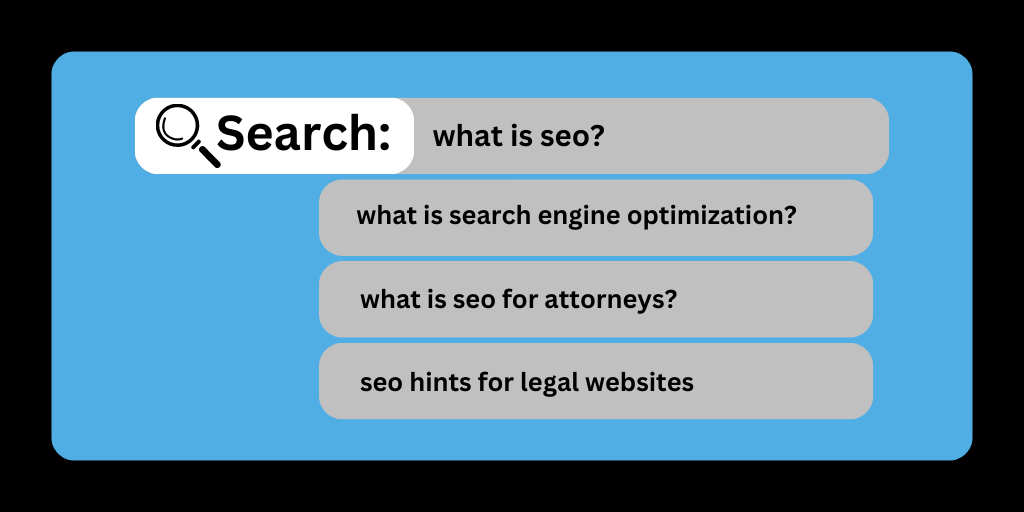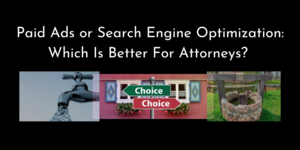In today’s digital age, having a strong online presence is crucial for the success of any law firm. One key aspect that plays a vital role in enhancing your online visibility is Search Engine Optimization or SEO. For those unfamiliar with the topic, it is no surprise that they would ask “What Is SEO?”
In this post, you will get an easy-to-understand, conversational guide to SEO, perfect for those new to the topic.
Let’s dive in!
Editor’s Note:
For those interested in a deeper dive into the fundamentals of and background in Search Engine Optimization (specifically targeted toward Law Offices), check out this post.
Demystifying SEO
Imagine the internet as an enormous library, and search engines like Google, Bing, etc. as its librarians.
When someone has legal questions or needs legal services, they turn to these “librarians” for guidance.
SEO is the process of making your law firm’s website more appealing to these search engines, so they display it prominently to people looking for legal services. Essentially, it’s like optimizing your website to speak the language of search engines.
It is the work done highlighting your legal website as an authoritative resource capable of satisfying user requests.
How Search Engine Optimization Works
To understand how SEO works, let’s think about how search engines operate.
When a person searches for something like “best divorce attorney in [Your-City]”, the search engine quickly scans its vast library to find the most relevant and trustworthy pages.
Several factors come into play, such as:
Keywords
These are the words or phrases people use to search for specific legal services. Identifying the right keywords related to your practice areas is fundamental to SEO success.
Content
Your website’s content should be informative, relevant, and well-organized. Engaging articles, blog posts, and practice area pages are all vital for good SEO.
Editor’s Note:
Two considerations when developing legal website content are EEAT and YMYL.
EEAT is a quality metric used by search engines (like Google) to evaluate content and websites overall. The measures include Experience, Expertise, Authoritativeness, and Trustworthiness.
Additionally, because legal topics have the potential to so greatly affect users, legal niches are also judged under the YMYL (Your Money Your Life) standards that more tightly evaluate the content and its quality.
Backlinks
Imagine backlinks as references or citations from other websites. When reputable websites link to your content, search engines perceive your website as trustworthy, which positively impacts your SEO.
User Experience
A website that is easy to navigate, loads quickly, and is mobile-friendly creates a positive user experience, leading to better SEO rankings.
Essential SEO Techniques for Attorneys
Now that you have an overview of SEO, let’s explore some practical techniques to get you started:
Keyword Research
Use tools like Google Keyword Planner to discover relevant keywords for your legal practice areas.
Focus on long-tail keywords (more specific phrases) to target potential clients better.
Whereas competition for a keyword like “divorce lawyer” or “who can handle my divorce” might be very high and difficult to improve your rankings, there are many more-targeted phrases that might be more effective and easier to use.
- divorce lawyer in [YourCity]
- what will happen to my kids in a divorce?
- how are assets divided in a divorce?
- who is the best divorce lawyer for business owners?
While all of these searches may have a much lower volume, ranking strongly for them can highlight you as a preferred option for that more specific audience.
High-Quality Content
Create informative and valuable content that addresses common legal questions, provides insights, and showcases your expertise.
This will attract and engage potential clients.
Editor’s Note:
For ideas on publishing content to your legal website, check out this post highlighting seven (7) different tips for writing effective content..
On Page Optimization
Optimize your website’s title tags, meta descriptions, and headings with relevant keywords. This helps search engines understand your content better.
Local SEO
As attorneys, you likely serve specific geographical areas. Optimize your website for local searches by claiming your Google My Business listing and encouraging clients to leave positive reviews.
Building Backlinks
Network with other legal professionals and participate in online legal communities to earn authoritative backlinks. Guest blogging on reputable legal websites is another excellent strategy.
Measuring Success With SEO
As with any strategy, it’s crucial to measure your SEO efforts. Use tools like Google Analytics to track important metrics, including organic traffic, bounce rate, and keyword rankings. Regularly assess your progress and make adjustments based on the data.
Wrap-up
Remember – Search Engine Optimization (SEO) is an expansive topic (for legal websites as well as other industries).
By developing a strategy for your law firm and implementing good SEO techniques, you can improve your online visibility, attract more clients, and stay ahead in the digital landscape.
As you begin your journey, keep in mind that SEO is an evolving topic that changes over time as search engines develop new ways to provide better results to their users.
Avoid focusing too closely on short-term results and approach search optimization as an ongoing process.
With time and focus, your law firm’s online presence will reap benefits similar to others who have already started this for their legal website.



